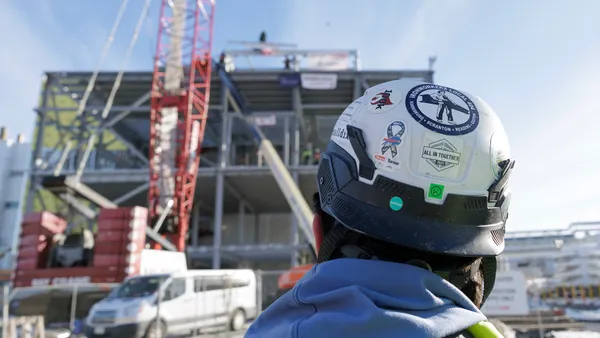Dive Brief:
- A new education and training facility in Reno, NV, will use the region's first virtual reality (VR) construction heavy equipment simulators in its heavy equipment operator training program, according to Equipment World.
- The Nevada chapter of the Associated Generator Contractors of America (AGC) received a $200,000 government grant to help launch the facility. Association officials expect the doors to open by late spring 2018.
- The 1,200-square-foot classroom will feature two large wheel loader simulator systems, a newly released tool from Caterpillar. The simulators marry original controls with common machine applications to teach various worksite jobs. A three-monitor configuration will give the operator the VR experience by allowing visibility in all directions.
Dive Insight:
VR adoption is growing rapidly. A forecast from International Data last year projected AR and VR spending would grow to $17.8 billion this year, up from $9.1 billion last year. From 2017 to 2021, the market research company predicts an average 98.8% compound annual-growth rate.
Major companies are working on furthering the technology, including AECOM. Last November, it signed a memorandum of understanding (MOU) with tech company HTC to develop VR for the AEC industry. Vive Focus, a standalone headset, will be the first product tested under the MOU. Sales of Microsoft's HoloLens mixed-reality headset expanded to 29 countries, and not only has prevented costly errors, but fosters virtual collaboration among remote employees, Microsoft says.
Companies also are leveraging VR in the design phase of projects when understanding visuals are key to understanding the project as a whole. Autodesk senior product line manager Nicolas Fonta told Construction Dive that, "We hear almost unanimously that VR is a much more natural way of reviewing design, that it's the best tool the design side has gotten its hands on in decades. Quality and performance improvements over time will make this a new way to think about interacting with design."
Such technology can help recruit and train younger workers as the ability to gamify formerly banal processes, such as safety and training courses, is appealing. Gamification of learning is proven to improve learners' engagement and retention. Although companies recognize using apps and technology can be helpful for training, only 26% currently use such methods, according to JBKnowledge data cited by Business Insurance.












